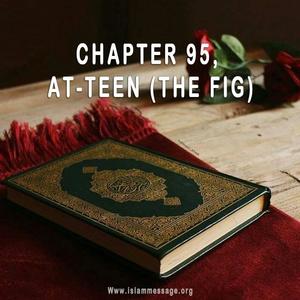
The Fig is a concise chapter of eight verses. Its name comes from the first words of the first verse. The majority of scholars agree that this chapter was revealed in Mecca and Mecca is mentioned in the chapter giving credence to this assumption. Meccan chapters, especially the short chapters at the end of the Quran, usually focus on the basics of Islam particularly the nature of the Hereafter.
In the previous chapter God promised to ease the hardship of Prophet Muhammad, may the mercy and blessings of God be upon him, and in this chapter we are reminded that all messengers of God went through hardship. We are also taught that human beings are created in an excellent way and are able to endure hardship. People can reach high levels of both endurance and faith by following the examples set by the messengers. Although short, this chapter is one of the most in-depth chapters in regards to the nature of humankind. God created humankind to be in perfect harmony with faith. If people deviate from the straight path, they risk sinking to the lowest depths imaginable.
Verses 1 – 3 Three oaths
This chapter opens with three oaths and we know that when God gives an oath, when he swears by something, He is then going to give a response that is related to the oath. The oath is the framework in which the central message of the chapter sits.
By the fig and the olive,
By Mount Sinai,
And by the secure city (of Mecca).
The first verse seems to be straightforward, God is swearing by the fig and the olive. Both fruits have many benefits for humankind. However, in the following oaths, God mentions places. Theses oaths have been much debated by the scholars of Islam. Some say that the foods are just foods we are familiar with; the fig was praised by Prophet Muhammad in his traditions and the olive is praised by God in the Quran particularly in chapter twenty-four. Others point out that, at the time, the Arabs would refer to a place by the food that was grown there. Thus, the words fig and olive can refer to the place where these were grown, the lands of Syria and Palestine. Mount Sinai clearly refers to the Sinai Peninsula, and the secure city is the city of Mecca.
All four places are the habitats of prophets, and the prophets are examples of human beings living their best life. It is said that the fig refers to the area in Syria where Prophet Noah built his mosque, and the olive refers to the Mount of Olives in Jerusalem and brings to mind Prophet Jesus. Prophet Moses is always associated with Mount Sinai, and Prophet Muhammad is the prophet most closely connected to the secure city of Mecca but so too is Prophet Abraham.
Verses 4 & 5 Human nature
People are made in the best form, and due to that stature, we have a great responsibility. We have been created in this manner so that we are able and equipped to follow the best way or path. God created humankind with special care; we are upright, symmetrical and balanced in form and nature. God intended humans to have a distinct rank in the universe. However, humankind is also given the quality of being able to stoop down to levels unreached by any other creatures.
When a person deviates from the upright nature God intended for him, he is able to reach down into the depths of degradation. People can become so overwhelmed by greed, selfishness, addiction, rage and fury, and other such traits, that morally they are reduced to the lowest of the low. When this happens, animals become more superior because they do not deviate from their God-given nature; they fulfill their functions as they have been guided. Humankind has been given free will to choose their behavior. Having laid out the path and sent guidance, God allows humankind to choose their beliefs and deeds, and subsequently their destination. Those who slip to the lowest level may be on a slippery road to Hell where they will be punished for their misdeeds.
There are some scholars that say the lowest of the low could refer to people who in their prime and strength did righteous deeds but in their old age were unable to continue them; there would be no reduction in their reward.
Verses 6 – 8 Righteousness and judgement
The importance of faith and good deeds now becomes apparent because these are what elevates the human being. Those who follow the messengers doing righteous deeds are the best of all people and will be abundantly rewarded. On the other hand, those who obstinately reject the messengers are the worst of the worst.
At the time many people said that Prophet Muhammad was lying about the Day of Resurrection and the Judgement. In these times also there are those who recognize that Islam is true, but they don't want to submit to God, so they call it lies. It would only be the lowest of the low that would behave like this, or lie about Prophet Muhammad. God is directly rebuking them by asking what sort of person would act like this. Misdeeds do not go unnoticed, God is watching, and He is the most just; He will reward or punish each person according to what he or she has done.


